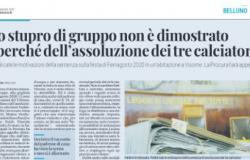Taking advantage of this space, Bosc fills the biographical void with all the imagination that the novel allowstransforming the last years of Gustave Courbet’s life into an ode to life and nature.
The author of “The Origin of the World” is a pleasant Rabelaisian ogre, therefore Bosc he adapts his writing to the image of the character: greedy and joyful. The words overflow from the pages like lavish dishes of a gargantuan meal, immersed in the paste of colors of a palette made of fresh water, wine and voluptuous female bodies.
Courbet is a paunchy bon vivant with simple manners, joyful, lover of fun and allergic to money. He drinks, eats and celebrates on every page. Despite his size, he does nothing but run and swim naked among the lake waters, among the puddles and above all among the rivers of white wine, always surrounded by his “family members”, those little artists who gravitated around him even during his exileready to starve and live in the open just to be close to the genius and participate, even in a small way, in the creation of his masterpieces.
Given the subject, Bosc can only concede to the reader several digressions into the world of art. At first furtively, then the forays become longer, more intimate, mixing biographical elements, analysis and poetry. A realist painter, Courbet despised the Orientalism in vogue in Paris. He prefers to observe clouds, leaves and women’s bodiesan opportunity for the narrator to translate Courbet’s figurative bucolic idylls into pages full of lyrical touches in which he can unleash his refined literary talent.
The novel does not just celebrate Courbet’s bright side; through always bold prose, Bosc also explores the shadows of his personality. His obvious addiction to alcohol, his complex relationships with women, and his struggle with illness are all addressed with frankness and compassion.
His diet inevitably leads him to cirrhosis, accompanied by ascites, an effusion that swells the peritoneum to the point of aberration. The painter, already imposing, saw himself swell at the end, until it literally exploded in 1877the year of his death.
With this 2013 work, translated into Italy by The Orma in 2017, David Bosc creates a portrait of Courbet far from the stereotype of the cursed artist. Rimbaud and Baudelaire, two of his contemporaries, embody this dark figure, constantly kept at a distance. Poverty and alcohol cannot stain the lightness of a free man until death, demonstrating that a land of exile can be that of a return to the origins. Art is not the whole man.




